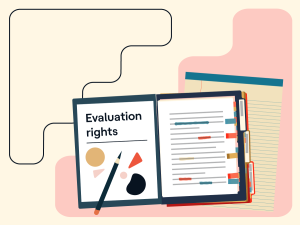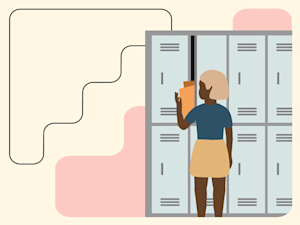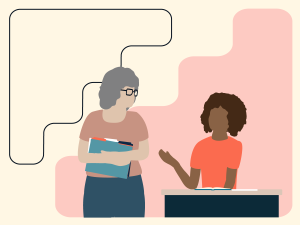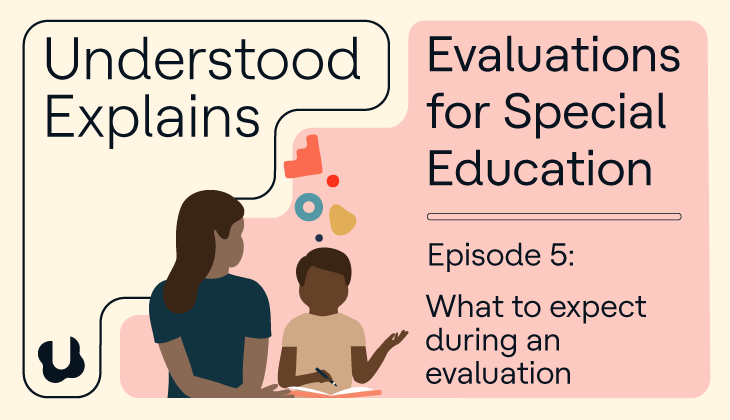Stay in the know
All our latest podcasts delivered right to your inbox.
What happens during an evaluation for special education? Who plans the assessment activities? And what role do families play? This episode of Understood Explains covers all of this and more.
Host Dr. Andy Kahn is a psychologist who has spent nearly 20 years evaluating kids for public and private schools. His first guest on this episode is Brittney Newcomer. She is a nationally certified school psychologist. Andy and Brittney will explain:
What to expect during an evaluation
Who plans the assessment activities
How you can help shape the evaluation plan for your child
Andy’s second guest is parenting expert Amanda Morin. They’ll share tips on how you can help your child get ready for the evaluation. (Hint: The answer does not involve any studying.)
Related resources
Episode transcript
Jaime: I am Jaime. I am living in Huntington Valley, Pennsylvania, which is right outside of Philadelphia. My son is Jonah; he has ADHD. He has a visual impairment, and he has just a general learning disability in basically every subject. So, the whole process of getting Jonah evaluated and acquiring all the necessary materials that the school needed was a complete mess. Every time I thought I was done, and we were good to go, they called me up and said, "Oh, we need another document" or "Oh, we need another record." It just felt like it was never-ending.
Andy: From the Understood Podcast Network, this is "Understood Explains." You're listening to Season 1, where we explain evaluations for special education. Over 10 episodes, we cover the ins and outs of the process that school districts use to evaluate children for special education services. My name is Andy Kahn, and I'm a licensed psychologist and an in-house expert and understood.org. I've spent nearly 20 years evaluating kids for both public and private schools. I'll be your host. Today's episode is about what to expect during the evaluation itself. We're going to explain how you can help the school get ready to evaluate your child and how you can help your child get ready. No, I promise this won't involve any studying. First, let's hear more of Jaime's story.
Jaime: So, the only way at all in which I was involved in his evaluation and planning process is they sent home basically like a questionnaire that the parent has to fill out in terms of behaviors that happen in the home with our child — I guess that was tight tied more towards the ADHD diagnosis, you know, asking all sorts of questions about impulsivity and social interactions with other people. I actually did remind them several times, "By the way, Jonah is different than most children in that he does have a visual impairment, and please test him to see if he qualifies for vision therapy because I know that you can get vision therapy at public schools." And also, I had said to them, you know, "At his previous school, he had speech therapy." I did remind them of that and pushed hard that I wanted to make sure that he got tested for all of those things and got those supports if they found that they were necessary.
Andy: It's very common for families to wonder about or worry about what happens during an evaluation. There shouldn't be any surprises for you or for your child. As a member of the evaluation team, you have a right to know about and help shape the evaluation plan for your child. My first guest is going to help me unpack all of this. Brittney Newcomer is a nationally certified school psychologist based out of Houston, Texas. Like me, she’s been in schools quite a long time. She's also a mom of two and an Understood expert, who has a master's degree in special education. Brittney, welcome.
Brittney: Thank you, Andy.
Andy: So, let's start with the big picture. Different kids need different evaluation plans, right? So, for example, some kids need to be evaluated for speech therapy, and some kids don't. But many evaluations tend to have one thing in common. And that's an educational evaluation, or sometimes you hear it called psycho-educational evaluation. This is where psychologists like you and me, Britt, we do some cognitive testing in areas like reasoning, memory and processing speed. We also look at like academic skills, reading, writing, math, and we look at social, emotional, and behavioral functioning. So, with these key areas in mind, academic, social-emotional, behavioral, how do you go about personalizing an evaluation plan for your kids?
Brittney: Yeah. So, when I approach planning and evaluation, you start with the referral reason. So why are we requesting this evaluation? And once we have that really clear picture of what the referral reason is, that's where I start to plan my evaluation. So, I gather as much data as I can first, you know, school records, information from the teacher, I typically talk to the parent. But then I sit down, and I plan the evaluation, which is essentially looking at some broad measures first, so to really give us a big picture of how the student is performing. So, when I say broad measures, I'm talking about things like behavioral scales that look at a broad spectrum of behavior.
Andy: So, like questionnaire kind of scales?
Brittney: Yeah, exactly.
Andy: All right, so let me try to sort of break some of this down. So, when we talk about like referral reasons, what are some of the questions that you're trying to answer?
Brittney: So, the first referral question that I usually ask is, in what ways is the student struggling? And then I also ask, on the flip side, in what ways is the student being successful? Where are they not struggling? I also look at factors that could be contributing to the student struggling. So, this could include things that are going on at home, this could include global pandemic, so just really looking at those factors that could be influencing the student's performance at that time.
Andy: So, I think you know when we use the word like comprehensive, you know, the idea that we're looking at a lot of bits and pieces of what this child's whole life is about. And for some families, that's a little bit anxiety-provoking, right? If they're having challenges, let's say in school, but you come in with a big broad question like this, how do you navigate that with your families when you're looking at the big picture? And they might be thinking, "Oh, I thought you were looking at my kid's reading" or some other specific challenge.
Brittney: I try to approach evaluations and working with families and how I sometimes explain it to them, is that you know, if we're using an analogy, like a jigsaw puzzle, so when we know what that problem is, at the end of the evaluation, we really want kind of a comprehensive, full picture of what's going on in the child. And the only way for us to get there is to have different pieces to put together to be able to see that full picture of what's going on with the child. So again, emphasizing we're not just talking about areas of need, and disability, we're also talking about strengths as well. And so, I do emphasize that with families right off the bat. But in order for us to get that comprehensive picture, we have to have their side as well, and what could be impacting the child. Because that's, in my opinion, one of the most important pieces is the input from the family.
Andy: Yeah, I think that makes a lot of sense. When you talk about your evaluation team, do you also have other members like teachers in the team? Or who else is at the table outside of those, you know, multidisciplinary, other evaluators, perhaps?
Brittney: Yeah, ideally, teachers would be at the table. Speaking in reality, and teacher schedules, it's often difficult to get them at that initial meeting. But their input is always provided; teachers can provide their input via writing, or we can call them into a meeting via Zoom and allow them to share their input with the classroom teachers are seeing on a day-to-day basis. It's a huge piece of that puzzle that we need to just consider during that initial referral meeting.
Andy: Absolutely. And depending upon your state, there may be requirements for the people who are around the table. So, for example, in the state of Maine, we are required to have a regular education teacher, a special education teacher, and an administrator around the table. Brittney, what are some of the timelines that you guys are honoring in Texas? You know, in Maine, we have a 45-day timeline from the day the referral is signed to having a completed evaluation. And I think the federal law, maybe 60 days, what do you folks use for your timelines in Texas?
Brittney: We have 45 days to complete the evaluation and have the report written, we then have an additional 30 calendar days, so not 30, school days, 30 calendar days to have that first meeting, IEP meeting, to review the results and determine eligibility.
Andy: So, for folks who are concerned about this for your individual states, you know, take a look at our page for this podcast and you'll see we've got some state-specific information there for you folks. As we can see, there's a little bit of variation across states. And it can be a little bit confusing, but you can certainly get some of that information from your own school staff. So, let's move on to some of the, you know, we had some, some brief conversation about the kinds of tests that you've been using. And maybe we can talk about how the process might look somewhat differently for different kids. You know, they don't all take the same tests. And because we're looking for different things, maybe we can talk a little bit about some of those specific kinds of tests.
Brittney: As a school psychologist, I have given many different types of cognitive intellectual tests. So basically, you know, one-on-one evaluations that look at how students learn. And I have, I know the differences and the different types of tests, like I do know that some are more hands-on, I know some that are heavily weighted in verbal input. And so, for a younger student, I really do, most of the time, like a very hands-on interactive type of testing, then sitting down one on one looking at an easel is very difficult for them. So, an easel would be just like, you know, cardstock with a card that a student would respond to, but there are certain tests that are very hands-on, and I know that's much better for my younger students. So, I'd say that's my first difference that may occur is what testing could look like for a younger student than what it would look like for an older student.
Andy: Sure. And I think when you talked about intellectual or cognitive, you know, for some people, we're looking at things like getting IQ scores, and I think it's very important to keep in mind as a parent, that these scores are really just designed to look at how your child is solving problems engaging in some of these very specific learning tasks. And as Brittney was saying, some of them might lean to more hands-on activities at times, some might be more language-like question and answer that are verbal tests. And again, for most of our, especially for our young kids, we're trying to establish something that we call a baseline. A baseline is getting like that first score. Okay, where is this child starting right now on the scale? And we look at it over time, because so much of our testing is a moment in time, it's a snapshot. Brittney, talk to me a little bit about the educational part. We've sort of talked a little bit about the IQ testing, or the cognitive testing, fairly similar words. But what else tweaks that sort of educational piece? Because you've described a lot of big-picture stuff. What about some of those specific pieces?
Brittney: Yes, so we also look at how the student is performing academically and with their achievement. So, when we look specifically at achievement, there are standardized tests that you can give that gives a snapshot of how the student is performing in reading, writing, and math. It's not the only piece though when you're looking at how a student's performing academically, and that's something I stress to parents. We're also looking at grades, we're looking at the student's response to the interventions that have been put in place by the school. So, for example, if a student is struggling in reading, and they've had a very specific reading intervention put in place, how have they responded to that intervention? Observations is actually a big part of this as well — seeing the student in the class where they are struggling, is a big piece of this.
Andy: So, we've been talking about the cognitive and educational parts of the psycho-educational testing, how do you approach the behavioral or social-emotional parts of psycho-educational testing?
Brittney: Specifically, when I approach the psychological component, this involves a lot less of one-on-one testing of the student, it involves a lot of observation, so seeing the student in different parts of their day. So how are they in the cafeteria? How are they in their classroom during a reading lesson? How are they during a more, or a time when it's less structured like music class? So really seeing a comprehensive view of their day in different settings. Observations are a huge piece of a psychological evaluation. It also includes interviews, so talking with the parent, talking with the student, and then also talking with the teachers.
Andy: So, what do you think families can do to help plan and get the right testing for their child?
Brittney: So, when we obtain consent, so consent saying we can move forward with testing, we typically talk about the major categories and some proposed testing measures that we'll use. This is where I really, really advocate to families to ask questions, find out exactly what type of what we mean, when we say cognitive testing. I really try to encourage families to ask questions throughout the process. So, making kind of checkpoints with the family. Okay, here's where we're at, here's what I'm thinking about in terms of next steps, what do you think? And just get, making sure, that their input is a part of that process.
Andy: Britt, let's talk a little bit about ADHD. Now, many families want to know if a school evaluation can diagnose their child with ADHD. But typically, school psychologists can't make a clinical diagnosis. So, you need a specific type of licensing like the one I have to make a diagnosis.
Brittney: When the referral question is around attention, impulsivity, when I am thinking that ADHD needs to be considered, I do have the ability to give scales rating scales, observations specific to ADHD. However, when I write in my report, I write about the characteristics that I'm seeing of ADHD versus the child has ADHD. In Texas, ADHD falls under Other health impairment and an Other health impairment has to be endorsed by a clinical doctor. If the child has an outside diagnosis already, it's a fairly simple process to where we send this form to the doctor, the doctor signs that yes, the student has ADHD, and that becomes part of their eligibility in special education. Now, when the child does not have an outside diagnosis already, that's where it becomes a little bit more complicated. So, I will describe what I'm seeing, I will describe the characteristics that I'm seeing, and then it is up to the family at that point if they do want to pursue the actual diagnosis of ADHD. So, they would then take the step to talk to a doctor about getting that official diagnosis.
Andy: Yeah. So, Brittney, you mentioned that schools need to get parents' consent; parents need to agree to the evaluation plan before the school can move forward. So, let's talk for a minute about parental rights. This season of "Understood Explains" has a whole episode about evaluation rights. But for now, I want us to touch on parents' rights during the planning part of the evaluation process. You know, when we think about English language learners, or homeschooled or private school students, are there any things you can share about their rights? Or how this part of the process might be different for them?
Brittney: Yes. So going back to that informed consent. For our English language learners, their families have the legal right to have that information presented in their native language. So super important and pretty obvious that we would want, you know, them to be informed in the language that they understand. But it is something that not all families know is a legal right. So, the other piece for our English language learners, is that there has to be a specialist that knows about English language acquisition. So, second language acquisition as part of the evaluation team. So, this was actually recent, I believe it was November 2021, federal guidance that they asked for a member of the evaluation team to have expertise in second language acquisition because we shouldn't be making a determination about why a student is behind academically if we aren't considering where they are acquiring English as their second language.
Andy: Yeah, that's absolutely huge. The idea that being able to evaluate somebody's reading or writing skills, for example, when they're not a primary English speaker is an unfair set of criteria. The reality is that not all standardized tests are fair for people who don't speak English as a primary language or people who are from a different culture, other than the dominant culture that created that evaluation tool. And we'll talk about the idea of culture-fair evaluations in other episodes, but this is what we're referring to here. You should not be at a disadvantage because you are not a predominant English speaker, or you're in the process of learning English as your second or third language for that matter. So huge. Thank you for that, Brittney. One other population group that I've dealt with in terms of the evaluation process was homeschooled and private school students within my public schools. Those students maintain the same legal right to free evaluations. And yet we within the public schools typically provided that assessment. What's that process been like for you? Have you had to do those within your school systems?
Brittney: So yes, it is the same process where the public school is responsible for providing that evaluation. We provide the evaluation for the family and the school, but the school isn't necessarily legally obligated to provide all the services that we recommend, based on what the student’s needs are. So that is a nuanced thing that I've experienced with private school evaluations.
Andy: Brittney, thanks so much for being here today. I can't thank you enough for all your expertise in time.
Brittney: Thank you so much for having me.
Jaime: So in order to prepare Jonah for the evaluation process, and the fact that there might be people sitting in and observing him, I basically just said to him, "Listen, you're starting a new school, you know, they're looking to see if you need vision therapy, they're looking to see if you need speech therapy, there's probably going to be some people coming in to either do some testing or just kind of watch you as you're learning. And I just want you to just be yourself and do what you normally do and let them do what they have to do, and they will find the best possible plan for you to make sure you get the best education possible." So, I just kind of laid it all out for him just so he knew what was happening, but he was a champ through the whole process and didn't even basically mention it at all, because he's so resilient.
Andy: We've been talking about how a team of adults does a lot of planning before the evaluation. What can adults do to help kids be ready for the evaluation or assessment process? My next guest is Amanda Morin. She co-hosts Understood's "In It" podcast about the joys and frustrations of parenting kids who learn and think differently. So, in talking about what to expect during this process, how do you help your child know what to expect? What kind of things do you suggest that we do to help them through that process?
Amanda: I think it's really important to really dial down anxiety for kids because they feel like they have to perform. I mean, regardless of how old a child is, they always feel like they're on display, and they have to perform. And especially when to get into middle school kids always feel like that anyway, right? But, when they're singled out in a way, they feel like they, they have to do a certain thing. And so, I think it's important to be able to say to your child, "There's really no expectation of you here; the expectation is that you're here, and you're going to participate." And it's really great to be able to say, "You know what? You don't have to study, these are not the kinds of things you have to study for; we're not expecting you to know all the capitals of all the states, there's no expectation that you have to know certain things."
Andy: Yeah, I'd say that, you know, when I talk to kids about the testing process, I'll always say to them, these activities are designed for kids through this entire age range. So, if I have an eight-year-old in the room, I'll say — so when we get to things that maybe a 10,12,14-year-old is supposed to know — "We're pretty sure that they're going to be hard for you, you might not even know what to do. So, keep in mind that as we go, sometimes things are going to get harder, sometimes things are going to be frustrating. And when you find that's happening, we know that it's working, and none of those things last forever. I will tell you, you're only going to be frustrated for so long until we move on to something else. We're going to do that for maybe three or four minutes, and then we'll move on."
Amanda: I think that's really good information for parents to have too, to be able to say to your child, there's going to be times where you're frustrated, there gonna be times when the person you're talking to can't tell you whether it's right or wrong, no matter how many times you ask them, they're not going to be able to tell you. And that's because that's their job. And I think sometimes, it's really important for parents to make sure that they are proactively saying to kids, "This is not about how smart you are, this is about what you're really good at, and what you have some trouble with. And we want to really know that so you can feel better about yourself, right?" And that's part of this. It's not just about what can we do to support kids in classrooms? It's also about what can we do to make sure kids feel better about themselves? And so, I think proactively addressing that is really important, too.
Andy: Yeah. You know, I think one of the pieces on the anxiety front — I want to dial back here for a sec — routinely, I will ask a parent, how does your child need preparation to know in advance that I might come in, grab them on such and such a day? Or is your child the kind of kid who would prefer to go with the flow and not have to anticipate this? Because some kids might ruminate about it and think and think and think, and not be able to focus on anything else. So, I think that's always an important thing for me when I talk to parents in advance of bringing their child in.
Amanda: So, really good point, I think the other component of that, too, is if you have a child who's going to think about that over and over again and be like, wondering about it, and then your schedule changes. So, you know, working in schools, schedules change periodically, and things change up. And if you're not able to go into the classroom and talk to that kid that day, that's a child who might worry, what happened? Why did that not happen today? So, I think that's a really good point, is to make sure that you understand whether or not your child's the kid who needs that advanced warning. When it comes to anxiety, too, it's also important to separate your own anxiety from your child's anxiety, right? It's really easy as a parent to say, "I'm anxious, so my kid is anxious." But that's not always the case. And so, tuning in to whether or not your kid is actually pretty laid back and is not going to worry about this, you can just say, by the way, remember, we may have talked about evaluation, you may have already told them this is coming you may not have, so this may be the first conversation you're having. But to be able to say to them, "Oh, just wanted to give you a heads up," instead of like, "This is a thing that's happening today and I'm very anxious about it and I'm going to impart that anxiety to you."
Andy: So, I think Amanda, you've really covered a lot of this. Is there anything specific though, that you think maybe we haven't covered about things you would avoid saying to your kids about what to expect in this process?
Amanda: I would avoid saying to your child, "This really matters. This is really important." Right? That's a lot of pressure. That's a lot of pressure on a kid. And I think that kids who have been in school for a while, are used to taking tests or doing homework assignments. And knowing within a couple of days how well they did on that. And so, I think it's really important to let your kid know, your child know, that we're not going to know right away, right? The evaluator may have or the person you sat down with into those activities with may have an idea of what this means, but we're not going to have that information right away. Don't worry about it. You know, don't worry about it, you did the best you could do, and we'll see what comes out of it.
Andy: So, we've talked about what happens during an evaluation, how you're part of the team that plans it, and how you can help your child get ready. If there's one thing you take away from this discussion, is that you can play a very active role in helping your child and the school, get ready for the evaluation. Don't be afraid to ask questions about what will or won't be part of your child's evaluation, and why. As always, remember that as a parent, you're the first and best expert on your child. In our next episode, we'll dive into what the evaluation results may look like and explain key terms to help you understand what the results mean for your child. We hope you'll join us.
You've been listening to Season 1 of "Understood Explains" from the Understood Podcast Network. If you want to learn more about the topics we covered today, check out the show notes for this episode. We include more resources as well as links to anything we've mentioned in the episode. And now, just a reminder of who we're doing all this for; I'm going to turn it over to Lee to read our credits. Take it away, Lee.
Lee: "Understood Explains" is produced by Julie Rawe and Cody Nelson, who also did the sound design for this show. Briana Berry is our production director. Andrew Lee is our editorial lead. Our theme music was written by Justin D. Wright, who also mixes the show. For the Understood Podcast Network, Laura Key is our editorial director. Scott Cocchiere is our creative director. Seth Melnick is our executive producer. A very special thanks to Amanda Morin and all the other parents and experts who helped us make this show.
Andy: Understood is a nonprofit organization dedicated to helping people who learn and think differently discover their potential and thrive. Learn more at understood.org/mission.
Host

Andrew Kahn, PsyD
is a licensed psychologist who focuses on ADHD, learning differences, anxiety, autism spectrum disorder, behavior challenges, executive function, and emotional regulation.
Latest episodes

July 13, 2022
How do schools evaluate kids for special education? For a quick preview, listen to the trailer for Season 1 of the Understood Explains podcast.

July 13, 2022
Is your child struggling in school? Are you wondering what supports might help? Get an overview of how schools evaluate kids for special education.

July 13, 2022
How do schools and families decide if a child needs an evaluation? Get tips to help decide if now is the right time or if you should wait.

July 13, 2022
What rights do families have in a school evaluation? Learn how special education law protects your rights during the evaluation process.

July 13, 2022
School evaluations are free — and you can ask for one at any time and for any reason. But the details you include can make a big difference.

July 13, 2022
What do all the numbers mean in your child’s evaluation report? This episode explains key terms and gives tips to help make sense of the results.

July 13, 2022
The evaluation report is done. Now what? Learn about eligibility determination meetings and different kinds of supports for struggling students.

July 13, 2022
Why do some families pay for private evaluations when the ones at school are free? Find out in this episode of the Understood Explains podcast.

July 13, 2022
How often do kids need to be reevaluated? Find out what to do about losing IEP services and how reevaluations can help teens get ready for college.
